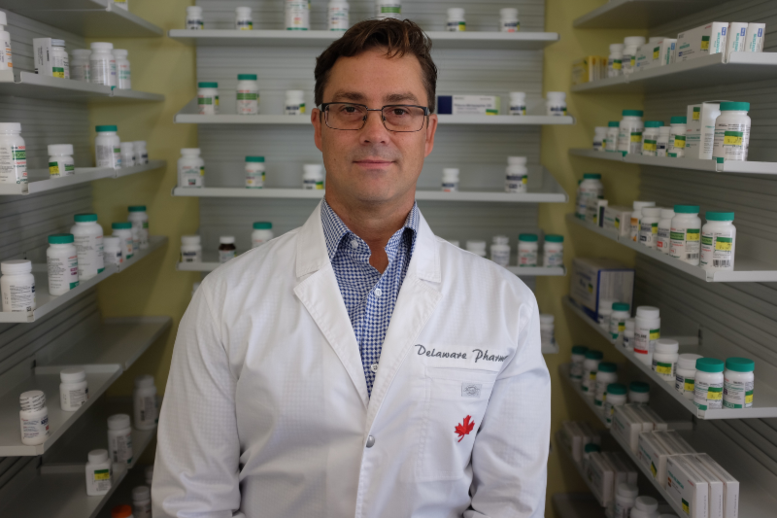In Ontario, a Canadian province with large rural regions, one pharmacist is no longer waiting for patients to come to his pharmacy. Instead, Jason Newman (pictured above) is going straight to the communities that most need access to naloxone, the lifesaving opioid overdose reversal medication. But as a result of conducting his grassroots harm reduction efforts, he is facing institutional blow-back—and may now even be stripped of his approval to be a pharmacist.
Newman is working to conduct naloxone trainings in “smaller, remote communities” and among “high-risk groups” in Ontario, according to the website of his nonprofit, the Foundation for the Responsible Administration of Emergency Medicines (FRAEM), through which he carries out his work alongside others.
But the Ontario College of Pharmacists is now investigating whether he dispensed naloxone to people in the community “without regard to individual need and/or clinical appropriateness” and whether he “improperly directed or permitted” non-pharmacists to dispense it in the community, among other things.
In response to these allegations, Newman told Filter that the program only “goes to places and participates in events where it has been invited.” Additionally, participants are “encouraged to only take a kit if he or she feels comfortable with what they’ve learned,” and trainings are “overseen by at least one pharmacist, and often two or more, depending on the size of the function.”
An anonymous complaint to the College alleged that Newman’s actions could “reasonably be regarded by members of the profession as disgraceful, dishonourable or unprofessional.” But Newman told Filter that his services are “thorough and professional,” providing each individual two trainings and written instruction on naloxone administration, as well as other opioid educational materials, before dispensing a kit.
Newman said that he cannot comment specifically on the College investigation. He makes one thing clear, though: Above all, though, his work is about saving lives in the face of an urgent overdose crisis.
The areas of Ontario being hit the hardest by fatal overdoses—the northwest parts of the province—also have far fewer locations that distribute state-funded naloxone. The rural Northwest and Northeast Local Health Integration Networks, as provincial regions delegated to unique health authority agencies, have the highest rates of opioid-involved deaths, at 22.4 and 15.6 per 100,000 residents, respectively. But pharmacies participating in the province’s reimbursement programs are spread much more sparsely in these devastated areas than in others.
Newman has previously continued his grassroots naloxone education work even after facing a roadblock that could have halted it. In February 2018, Newman formally agreed to the Ontario College of Pharmacists’ demands that he stop distributing the medication except at his pharmacy—yet his work “has never ceased” since then, he told the Globe and Mail.
“If we did not dispense naloxone in a proactive manner, there would be many Ontarians who would have lost their lives to the crisis this year alone. To us, the ethical obligation to continue our outreach program seems too important to stop our work. Lives are on the line,” said Newman.
His hearing before the College regarding the allegations against him is scheduled for November 1. Regardless of what happens, he and FRAEM will still “save lives and continue handing out these kits,” Josh Mazur, the foundation’s policy and advocacy officer, told Filter. “The consequences for average Ontarioans far outweigh the risks of passing out naloxone.”
Photograph of Jason Newman, from Delaware Pharmacy’s website





Show Comments